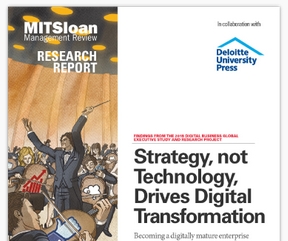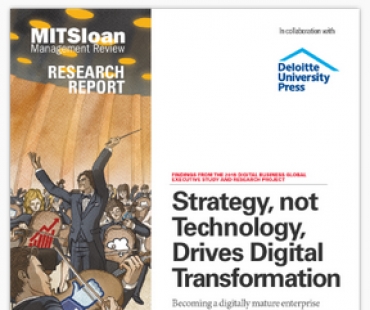
 Concerned with their organizations’ digital capabilities, employees across all generations want to work for digitally maturing organizations
Concerned with their organizations’ digital capabilities, employees across all generations want to work for digitally maturing organizations
New research released by MIT Sloan Management Review and Deloitte Digital finds that many employees across all generations are dissatisfied with their organization’s digital progress to date and are voicing a desire to work for digitally mature leaders, suggesting upcoming retention challenges for many companies.
The report further found that the ability to digitally transform and reimagine a business is determined in large part by a clear digital strategy supported by leaders who foster a culture able to change and reinvent their organizations. The report, Strategy, Not Technology, Drives Digital Transformation, is based on findings from the fourth annual global survey of more than 4,800 business executives across 27 industries and 129 countries.
It found that employees by large margins want to work for digitally maturing organizations. Nearly 80 percent of respondents want to work for a digitally enabled company or digital leader, and the sentiment crosses all age groups from 22 to 60 nearly equally.
These digitally mature organizations understand continued digital advancement depends upon retaining and developing talent. More than 75 percent of respondents from these companies agree or strongly agree that their organizations provide the necessary skills to capitalize on digital trends. Among low maturity entities, the number plummets to 19 percent.
The following are highlights of the study:
Digital strategy drives digital maturity. Only 15 percent of respondents from companies at the early stages of what the study refers to as digital maturity—in which digital has transformed processes, talent engagement and business models—say that their organizations have a clear and coherent digital strategy. Among the digitally maturing, more than 80 percent do.
The power of a digital transformation strategy lies in its scope and objectives. Less digitally mature organizations tend to focus on individual technologies and have strategies that are decidedly operational in focus. Digital strategies in the most mature organizations are developed with an eye on transforming the business.
Taking risks is becoming a cultural norm. Digitally maturing organizations are more comfortable taking risks than their less digitally mature peers. More than 50 percent of respondents from less digitally mature companies see their organization’s fear of risk as a major shortcoming. To make their organizations less risk averse, business leaders should embrace failure as a prerequisite of success. They must also address the likelihood that employees may be just as risk averse as their managers and will need support to become bolder.
The digital agenda is led from the top. Maturing organizations are nearly twice as likely as less digitally mature entities to have a single person or group leading the effort. In addition, employees in digitally maturing organizations are highly confident in their leaders’ digital fluency. Digital fluency, however, doesn’t demand mastery of the technologies. Instead, it requires the ability to articulate the value of digital technologies to the organization’s future. More than 75 percent of respondents from digitally mature companies say their leaders have sufficient skills to lead digital strategy. Nearly 90 percent say their leaders understand digital trends and technologies. Only a fraction of respondents from early stage companies have the same level of confidence: 15 percent and 27 percent, respectively.
Stories gain employee buy in and organizational traction for digital transformation. Telling digital stories creates pride in organizations. Companies need to demonstrate their ability to tell the digital story and what it means to live in the digital world for business.
Innovation of digital technologies must be fostered. More than 70 percent of respondents from maturing companies say that their managers encourage them to innovate with digital technologies. At lower levels of maturity, only 28 percent of respondents express the same sentiment.
Investments in skills necessary to realize strategy. Digitally maturing organizations are four times more likely to provide employees with needed skills than are organizations at lower ends of the spectrum.
“Employees are paying attention to their organizations’ digital initiatives,” says Gerald (Jerry) Kane, associate professor of information systems at the Carroll School of Management, Boston College and co-author of the report. “Many employees are dissatisfied with their organization’s digital progress to date.”
Deloitte Digital’s Doug Palmer, co-author of the report and principal, Deloitte Consulting LLP, adds, “The importance of having a clearly articulated digital strategy was a major finding. Those companies developing enterprise-level digital strategies are moving ahead, while those that aren’t are struggling. These digitally maturing companies embrace innovation and collaboration and have leaders who understand both technology and its potential impact on the business.”
